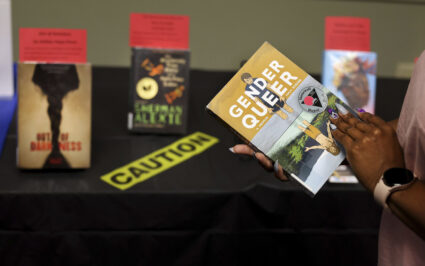
The song, released Wednesday, describes how “a city aflame fought fire and ice ’neath an occupier’s boots,” which Springsteen calls…

A graphic novel that explores gender identity and sexuality has topped the list of the most challenged books in the U.S. for the second year in a row.
Maia Kobabe's memoir "Gender Queer," which made its first appearance on the American Library Association's list of top 10 banned books in 2021, was included in 151 different challenges last year. Detractors objected to its LGBTQ+ themes and accused it of containing sexually explicit content, according to a report released Monday. The ALA's figures are based on news reports on attempted book bans, as well as voluntary accounts from schools and libraries.
The ALA's report also noted that 90 percent of the documented book challenges from last year demanded that multiple library books be censored. Of those, 40 percent wanted to remove or restrict more than 100 books all at once. The association said this is a shift from how challenges were brought forth in prior years; before 2020, the vast majority of challenges came from a single parent concerned by a book their child had access to.
Overall, more than 2,500 unique titles were targeted in 2022, the highest number of attempted book bans and restrictions since the association's Office for Intellectual Freedom began keeping track of this data more than 20 years ago. Other books that have been targeted — largely by conservatives — for topics such as race, gender and sexuality include George M. Johnson's "All Boys Aren't Blue" and Toni Morrison's "The Bluest Eye."

Across the country, the ALA documented more than 1,200 challenges — a significant rise from 2021's record-breaking 729 challenges. In 2019, that number was 377. According to the ALA, who released new data earlier this month, the true number is likely higher since many challenges go unreported.
The latest data comes amid the growing, organized calls for book bans and restrictions from a conservative political movement "whose goals include removing books addressing race, history, gender identity, sexuality, and reproductive health from America's public libraries and school libraries that do not meet their approval," said Deborah Caldwell-Stone, director of the ALA's Office for Intellectual Freedom, in the report.
These groups use social media and other channels to "initiate a mass challenge that can empty the shelves of a library," she added.

Kobabe's book was one of the most challenged titles in St. Tammany Parish, a suburb of New Orleans, where librarians have also been targeted and faced harassment from conservative activists. Others, like the national, conservative group Moms for Liberty, have amplified the calls for book removals and restrictions in the name of 'parental rights' in multiple states. Republican legislators in Missouri made an attempt to defund libraries for offering certain books they deemed inappropriate.
In Monday's report, ALA President Lessa Kanani'opua Pelayo-Lozada underscored how libraries are central to the communities they reside in.
"When we talk about inclusion and being seen, we mean included and seen in all the intersectionalities of our lives, including race, ethnicity, gender identity, religion, ability, socioeconomic status, and more," the former children's librarian wrote. "When we talk about inclusion in libraries, we take all of these into account and take the wholeness and humanness of our communities into account, which is why we are the trusted institutions in our communities."
Kobabe, who uses Spivak pronouns (e, em, eir), describes the process of coming out as nonbinary and asexual in "Gender Queer."
Kobabe also notes in the book just how affirming it was to discover queer books at a library as a high schooler. The author namechecks Japanese manga artist and writer Sanami Matoh and fantasy novelist Mercedes Lackey, whose books, Kobabe wrote, "include very tame gay sex scenes."
In one illustrated panel, the young author is holding a book with lightning-like lines emanating from its pages.
The sensation from reading these scenes, from these books, was like "electricity flowing directly into my palms."
In a 2021 column for the Washington Post, e wrote that the book "Gender Queer" is generally meant for readers in high school and above, but added that the primary readers in mind were for eir own parents and extended family who didn't understand what it meant to question and explore your own gender identity.
Queer youth are "often forced to look outside their own homes, and outside the education system, to find information on who they are," Kobabe wrote.
Sustain our coverage of culture, arts and literature.